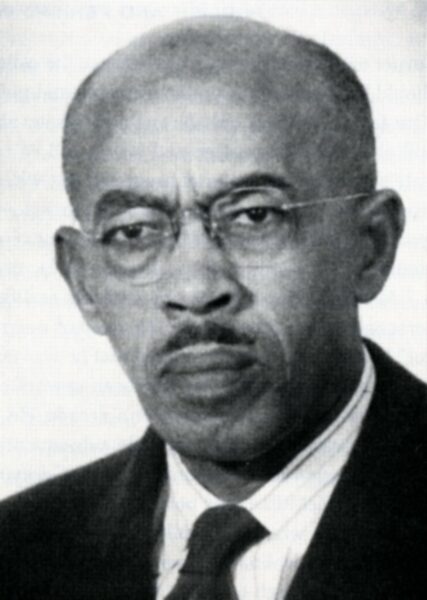
Lewis K. McMillan. Photo courtesy Historical Collection, South Carolina State University
Lewis K. McMillan was the first full-time faculty member with an earned doctorate to teach at South Carolina State College (now South Carolina State University). By law, SC State could only enroll and employ members of the Negro race. Because only small numbers of African Americans earned doctorates in the first half of the 20th century, the college was unable to hire a faculty member with a PhD until McMillan arrived at the Orangeburg institution in 1947—over 50 years after its 1896 founding.
McMillan was born into rural poverty in Allendale, South Carolina, in 1897. He first attended public school at age 11 and attended a high school in Washington, DC, affiliated with Howard University. In 1922, he earned a bachelor’s degree in social sciences at Howard, followed by a bachelor’s in divinity from Yale University in 1925. McMillan went on to earn a PhD in history and philosophy from the University of Bonn in 1933.
He taught at several historically Black colleges and universities, including Virginia State, Bishop College, and Wilberforce University, before settling in at SC State to teach history and periodically German. McMillan was regarded by students and colleagues as affable but a bit eccentric. He invariably greeted those he encountered on the campus with a friendly “Hi, neighbor.” In one history class, he instructed students to copy the inscriptions on Confederate monuments located in their hometowns, which students considered an odd assignment.
McMillan’s academic career ended abruptly in 1953 when he self-published Negro Higher Education in the State of South Carolina. Having worked diligently on the manuscript for several years, McMillan regarded his study as a balanced, scholarly, but critical examination of the state’s Black colleges. Yet readers were outraged at McMillan’s work. Black people complained that he blamed administrators and faculty members for embracing the status quo while detailing the woeful shortcomings of “their” schools. For example, he wrote that Allen University had lofty aims, but that it was “a monstrous bit of empty prattle,” and that its faculty “initiates nothing; it votes on nothing; it determines nothing.” On Benedict College’s preparation of Black teachers, he wrote “these young people will almost never get in trouble, for they are not taught to bother about anything that is substantial.” White people did not appreciate McMillan’s condemnation of their neglect, indifference, and outright hostility to Black higher education. He wrote, “Neither the State’s educational leadership nor its political leadership has ever placed [SC State] in the equation of the State’s scheme of public higher education. Out there to itself, it serves now and always as a mere make-believe, a thing to point to when legal questions of educational equity are raised.” Rather than provoke reforms, as McMillan had hoped, its publication led to his swift dismissal from SC State.
There was no tenure policy in place for college faculty members. McMillan’s appeals to the Southern Association of Colleges and Schools, the American Association of University Professors, and the American Civil Liberties Union were greeted with a lack of interest and an unwillingness to intervene. He asked the college’s all-white and all-male board of trustees to reinstate him, writing, “The only language I know, or have ever known, is the language of freedom—freedom of existence, freedom of thought, freedom of speech. Freedom, gentlemen, is for me a way of life.” They ignored his plea. In a letter to SC State president Benner C. Turner, historian Howard K. Beale (Univ. of Wisconsin) denounced his termination: “It seems to me that you are unworthy to be a president of a Negro college in the South if you are not, yourself, ashamed of your college and the terrible discrimination against Negroes in South Carolina.” But Beale did not suggest that the University of Wisconsin or any other predominantly white institution might employ McMillan. Turner blacklisted McMillan, and no HBCU would hire him. His career in higher education was over.
Exiled to Connecticut, McMillan taught at Bullard-Havens Technical High School. He also taught part time at the University of Hartford and in the evening program at the University of Bridgeport. He served on the Stratford Board of Education from 1963 to 1965. He was fond of Germany, and he made nostalgic visits in 1949 and 1967.
Lewis K. McMillan died in Stratford on July 7, 1974. He was survived by his wife, Kathryn, who he had married in 1943. She died in 2006. They had three children: Lewis K. McMillan Jr., Benet McMillan, and Elizabeth McMillan Baillergeau.
William C. Hine
South Carolina State University (emeritus)
This work is licensed under a Creative Commons Attribution-NonCommercial-NoDerivatives 4.0 International License. Attribution must provide author name, article title, Perspectives on History, date of publication, and a link to this page. This license applies only to the article, not to text or images used here by permission.